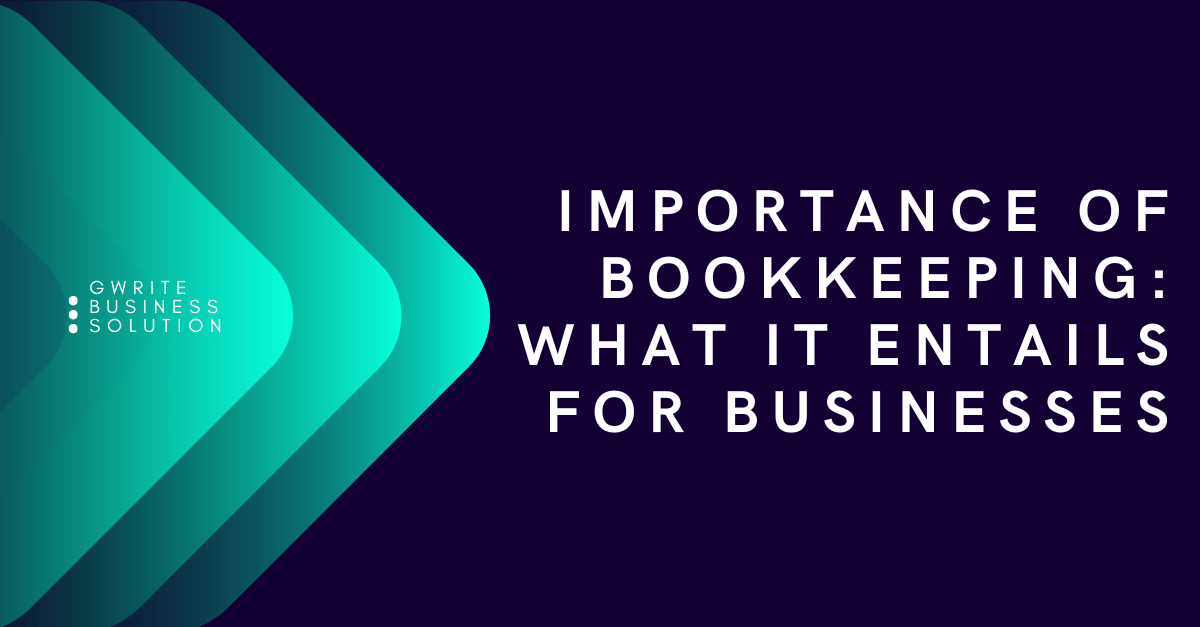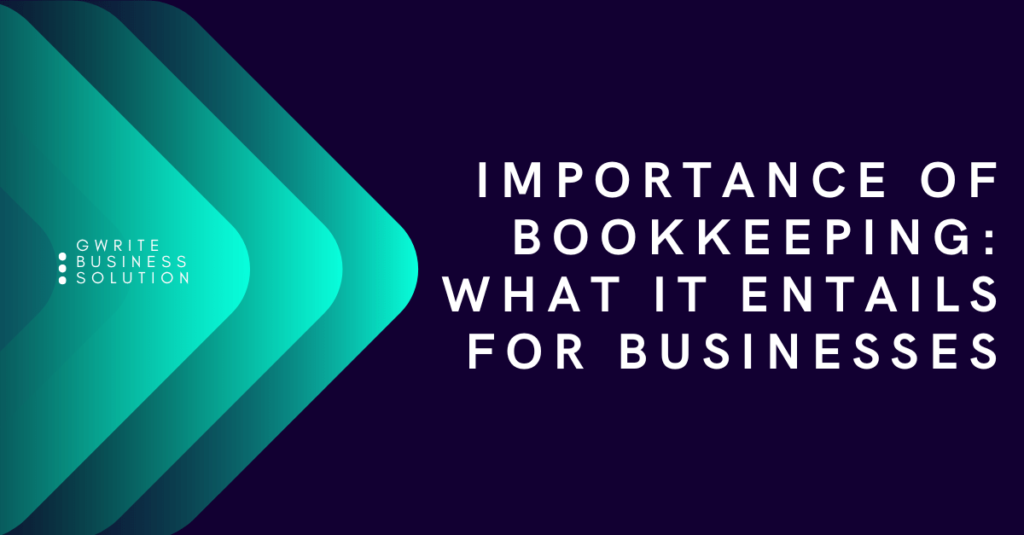Bookkeeping encompasses how a firm’s financial activities are recorded, classified, and stored. It provides the means for proper decision-making.
Ideally, bookkeeping helps businesses satisfy all the legal requirements concerning their finances, thus enabling them to achieve their long-term goal of sustainability.
Whatever its size or line of operation, proper bookkeeping is crucial in sustaining a business’s financial health and operational efficiency.
In that case, let’s look at the importance of bookkeeping and what it entails for businesses.
The Importance of Bookkeeping

1. Bookkeeping Ensures Transparency in Finances
One of the major importance of bookkeeping is presenting a company’s financial position in clear terms.
The proper records of incomes and expenses, assets, and liabilities of the businesses enable one to estimate the profitability of a firm, the cash flow, or whether there is a financial crisis that calls for financial modification.
Such clarity must ensure the right decisions regarding investments in a business, for example, perhaps new equipment.
Equally, it may be more workers or scaling back the resources put into something that is not needed at all.
Financial clarity for businesses involves identifying leakages in their operations through wasteful spending or inefficient ways.
A case in point would be that through bookkeeping, a business might realize how much money it spends on utilities or perhaps on subscriptions it does not need, for which corrective measures must be taken to increase the bottom line.
2. Ensures Legal Compliance
Each business has to follow various tax laws and financial regulations. Good bookkeeping helps to keep proper records, which may be presented in front of the tax authorities or auditors.
Also, the chances of penalties, fines, or any other legal implication will decrease. Organized and updated records in order may make a business confident during audits or tax filing.
For instance, most countries have requirements that businesses keep bulky records of expenditures to support deductibles against taxes.
Records in this regard are mostly incomplete without good bookkeeping practice and may hence lead to some financial losses or compliance problems.
In most cases, good financial records become decisive in the amicable resolution of disputes with regulatory authorities by way of proving that a business lives up to set standards applicable to them.
3. It Helps Budgeting and Planning Allowances
Good bookkeeping forms the basis for good budgeting and financial planning. The data from the past can be used to estimate the income and expenses in the future, hence the chance to present realistic financial goals and implementation.
For example, a company maintaining correct bookkeeping records shall estimate the seasonality of revenues and thus prepare for lean months or fully use the high-demand periods.
Budgeting also helps such businesses strategize how they would be able to respond to any sudden financial limitation. This again allows the firms to make, when fully conscious of their financial standing, emergency provisions or plan some important expenses like upgrading equipment or renovating offices without actually affecting the running of businesses.
4. Bookkeeping Improves Decision-Making in Businesses
This also allows the owner or manager to make informed decisions regarding business, as through records, factual data is presented.
It may be a question of a decision on the viability of the introduction of a new product, expanding operations, or cost-cutting; whatever the case, bookkeeping will provide the necessary insight into the risks and opportunities.
For instance, a restaurateur may find from his records that weekends usually have the highest sales; therefore, he arranges for more staffing on those days or he devises weekend promotions to maximize income.
In a retail enterprise, for example, one can know which lines are the top performers so one can focus promotional resources there for maximum value in growth and profitability.
5. Tax Preparation Assistance
Most business enterprises with entangled operations usually find tax preparation somewhat overwhelming. All the financial information is kept in one place by bookkeeping; hence, this process is simplified.
During the period of taxation, it will be easy for a business to refer to the records of transactions, deductions, and income statements to avoid errors or omissions during filing.
Furthermore, proper bookkeeping keeps accurate records so that any tax deductions to which the business is entitled may be taken. Things like vehicle miles, office supplies, and employee training are all good deductions to take to reduce income liability. For international businesses, bookkeeping tracks currency conversions and international tax liabilities for easier cross-border compliance.
6. Better Management of Cash Flow
Cash is the lifeblood of all businesses, and good bookkeeping ensures that it keeps pumping the flow. It keeps track and makes sure that, besides payables and receivables, one always has money on hand to pay suppliers, utility bills, and wages to employees.
It also helps in finding those that pay late, so that businesses, by which means, can immediately make a follow-up in order not to disrupt cash inflow.
A small manufacturing business can, for example, from books and records, set up the terms of payment for customers so that it would have good cash inflow to enable it to produce its merchandise without hold-ups.
7. Bookkeeping Attracts Investors and Lenders
Investors and lenders look at financial records to estimate the viability of the company to award it a credit status.
Bookkeeping will show how well your business is run and how healthy your finances are, therefore boosting your chances with lenders.
For example, a start-up business in need of venture capital can present its bookkeeping statements as a means to reveal the trends relating to the growth of the business, cost control, and profitability.
Similarly, a small-scale business in a credit application can use its financial statements as a means to declare its payback ability.
With the right bookkeeping, the correct picture is portrayed, hence a way to win the confidence of any interested partner or associate since it acts as an indication of a business that is transparent and trustworthy.
8. Avoids Financial Pitfalls
Human errors in financial management are so common, especially for those companies that deal with a lot of transactions.
It helps minimize errors by automatically performing calculations and flagging inconsistencies, especially supported bookkeeping systems with accounting software.
For example, today’s bookkeeping software automatically flags duplicate transactions, unmatched accounts, or extraordinary expenses.
This allows the business to immediately investigate discrepancies in such a case. It is this level of accuracy that gives stakeholders confidence and lessens the possibilities of fiscal mismanagement.
9. Allows for Growth and Scaling
A business usually expands, and with an increase in operations, the financial transactions also become more complex.
Good bookkeeping sees to it that the financial system of a business grows up with its operation. The laying of proper bookkeeping from the beginning, therefore, sees to it that businesses keep out of financial chaos while growing.
For example, a retail chain just opening its stores might need some bookkeeping records to determine how each store performs and stands in terms of the level of inventories and marketing budget.
In addition, scalable bookkeeping will allow business owners to conduct advanced analytics to apply long-term growth strategies.
10. It Helps Build Business Credibility
It is the ground for transparency and accuracy in all the financial records that breed trust among customers, employees, and partners.
A company that keeps its books clear looks reliable and trustworthy, and this may be better for relationships in further successful development.
For instance, a supplier will be willing to give credit terms to a business that shows financial discipline based on well-maintained bookkeeping records.
Secondly, it could be that employees might feel confident with a company that pays payroll on time and presents periodic and clear financial reports.
Final Thoughts
In summary, besides being a statutory requirement, bookkeeping is one of the most important instruments for stability and growth for businesses.
It instills clarity and compliance and informs decisions so that a business can better navigate the pitfalls and capitalize on opportunities.
Whether it is a manual bookkeeping method or an updated software system, the more seriously a business takes its bookkeeping, the better prepared they are to thrive in today’s competitive landscape.
Good bookkeeping practices, whether in small or large corporations, are part of the financial strategy but also an element in how the long-term success of an enterprise is realized.

